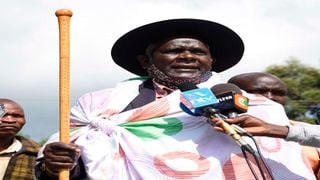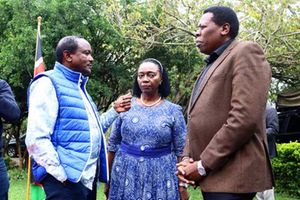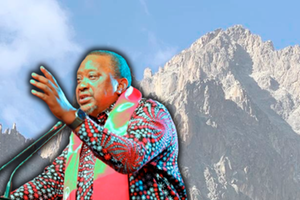
Talai elders.
| File | Nation Media GroupNandi
Premium
The Talai crowned leaders safely for decades, until they blessed DP Ruto
The Talai, a clan that has crowned Kenya’s top leaders, including presidents, draws its pride from the leadership of Orkoiyot Koitalel arap Samoei.
Under Koitalel, the Nandi waged a successful 10-year armed resistance against foreign occupation, humiliating British officers one after another.
Koitalel was the face of Nandi resistance against British colonial rule. He was shot dead by British officer Richard Henry Meinertzhagen after being lured to a truce meeting that never was.
When Koitalel arrived at the venue on the morning of October 19, 1905, Meinertzhagen shot him at point-blank range as the Orkoiyot stretched his hand to shake the Briton’s.
He had been appointed successor to his father Kimnyole and was made Orkoiyot in 1895 as British colonialists began building the Ugandan railway through Nandi territory.
The Talai clan is found in Kapsisiywa, Nandi County, as well as in Kericho, Bomet and Trans Nzoia.
Five sub-clans
Clan members who are descendants of the Nandi legendary leader and his honoured son Barsirian arap Manyei, Kenya’s longest-serving prisoner in the colonial era, are divided into five sub-clans — Kapturgat, Kapsonet, Kapsogon, Kapmamursoi and Kapchesang.
The clan, revered for wielding purported mystic powers that include possessing the ability to change the weather, read the stars, tell the future, cast spells to bless or curse, and influence a cause of action say their powers and heritage were inherited from their biblical relatives.
The community is still widely consulted by communities, individuals and political aspirants in Uganda, Kenya and Tanzania to seek direction.
Traditionally, the work of the Orkoiyot, the official Talai clan leader, was to provide leadership to the community, with the leadership mantle passed on from one generation to another in the order of lineage and sons.
The Talai accuse the colonial government of perpetrating systematic human rights abuses on them, including murder, theft and loss of ancestral lands, detention without trial, imposition of internal exile and travel restrictions, and the desecration of Koitaleel’s body.
They, by extension, view themselves as the ‘direct descendants’ of the family of Jesus Christ in ancient Israel.
Queen of Sheba
They claim to be the direct descendants of the Queen of Sheba mentioned in the Bible, who had an affair with King David’s son King Solomon, thereafter bearing him a son, Menelik I, whom the Talai claim to have direct ancestry to by birth.
“We have God’s blessings. We are members of Joseph’s family in the Bible. Their totem is a lion and ours too is a lion. We migrated together with the Luo from Israel. Sinai is derived from our language to mean, ‘so that you know’. We came through Misri (Egypt),” explains Frederick Songol, a member of the Talai Council of Elders.
The Talai have complained about being discriminated against by the colonial regime, something they claim continues to this day. Clan members said the British government forced them to live in isolation and in detention camps in the mosquito-infested ward of Kapsisiywa and they still want Britain to accept liability and compensate them for torture.
“King George V said the Laibon had to be separated from the Nandi community and the colonial governor Joseph Byrne also stamped this declaration … to move outside Kapsisiywa, you had to ask for permission from the colonial government,” says Rev James Bassy, the Talai Council of Elders chairman.
The elders say that the country’s founding father, Jomo Kenyatta, honoured the clan’s contributions and ensured that the national emblem bore the symbols of the Talai lion totem.
“When the colonisers came to Kenya, they found that the Kalenjin had huge tracts of land. We fought for more than 10 years and they tricked us by telling us to come together and make peace, only for them to kill our leader Samoei,” Mr Songol says.
“Therefore, they decided to detain a number of us from the early 1900s in Kapsisiywa, Nandi County. Others were taken to Maralal and some to Gwassi so that they could die from tsetse fly infestation.”
Christopher Koyogi, another Talai elder, says that the clan anointed Jaramogi Oginga Odinga in 1959 and blessed him to take over Kenya’s top leadership just before independence but Jaramogi instead declared Kenya would not be free unless the late Mzee Kenyatta was freed from prison.
“Had Jaramogi not decided to step down for Mzee Kenyatta, he would have been the founding President but he settled for the vice-president position, which he served for a short time before he fell out with Jomo Kenyatta,” Mr Koyogi says.
“In 1969, we blessed Jaramogi Oginga and gave him a lion's totem, which was later used by Ford.”
They also anointed the late Daniel Toroitich Moi in1955 and he was elected representative for Rift Valley in 1957 for the Legislative Council of Kenya (LegCo).
The Talai elders, the two say, had foreseen that Mzee Moi would end up becoming President of Kenya. He took over in 1978 when Mzee Kenyatta died, serving for 24 years.
They also blessed the third President, Mwai Kibaki, in 2005 so he could retain his seat in the hotly contested 2007/2008 election against Raila Odinga and he served until 2013.
The clan elders explain that the former premier was blessed before the 2008 election but they saw that Kenya would experience bloodshed and Mr Odinga would win but not be given power by President Kibaki.
“For years we have been blessing people, including warriors when they go for a battle and they triumph,” says Amos Korir, another elder.
Sought an apology
The clan also sought an apology from President Uhuru Kenyatta for the actions and omissions of his predecessors from 1963 to 2007, with the community complaining that they did little on injustices meted on the community and that they say continued after independence.
Nandi residents also claim the Talai have presided over disputes, including land-related, where outer forces are employed to clarify a boundary either by creating a river along the disputed land boundary or by other means.
Some negative aspects of the clan’s purported powers have caused them to be hated and feared among residents, accused of using their powers to punish mistakes like theft and revenge missions. This fear, it is claimed, has led to their marginalization.
The Talai want to sue the British government for forceful eviction from their original homes in parts of what is today Aldai, Nandi Hills and Tinderet sub-counties in the colonial era.
Talai elders say clan powers were only meant to be used for good and not for revenge.
They have been adorning leaders with the community's sacred leadership regalia — 'Sambut', 'Kuutwet', 'Sharit' and 'Rungut' — which makes someone a political leader.
For years, they have performed coronations without any dispute, but Deputy President William Ruto’s coronation in June last year has left the clan divided down the middle, after Mr Koyogi questioned the cultural procedure that led to the dawn ceremony.
Questions continued on who is right on the 'coronation' of a political kingpin of the Kalenjin community after Mr Bassy and his embattled vice-chairman Mr Koyogi disagreed on how the event should be organised.






